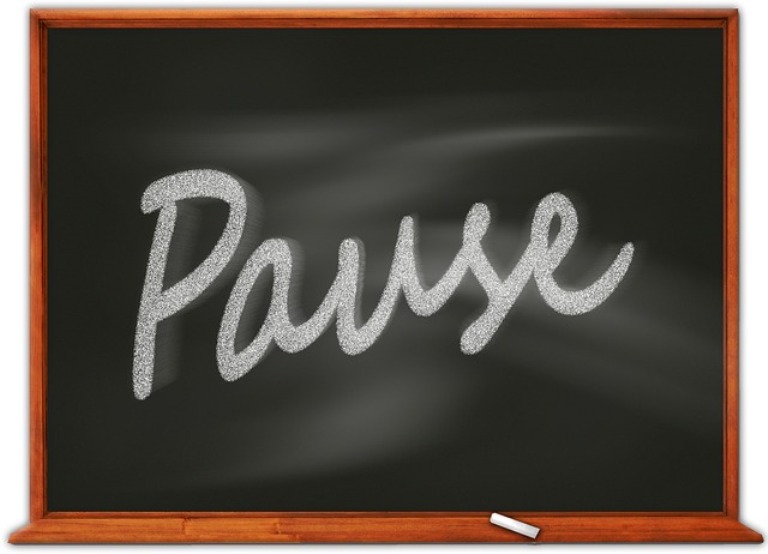
All of us are busy beings as life is running out of time. Nobody has time to contemplate and wait for a while. Thus, “practice the pause” can be a great life lesson to be learned and used in our daily living.
Stopping is not something that we do or even think of doing in various situations that we come across. It is essential to take a short break and maintain a mental quietness for thinking before we speak or act.
Practice the Pause Meaning
“Practice the Pause” is a famous life quote used by Lori Deschene, An American author. It simply means a learned skill, where you take a break, stop or cease to react, speak or act.
It is a temporary state of halt or cessation in speech and action. You do not react to the various events in your life automatically, rather stop for some time and think about the situation, before responding to it.
Pause Meaning
The dictionary meaning of pause says that it is a temporary rest, especially in speech and action. It is a cessation of action because of doubt, uncertainty, and hesitation. A small break or rest in speaking and action is qualitatively essential to bring in variety and avoid monotony.
This time interval between environmental cues and your action is beneficial for a better understanding of yourself and stops you from jumping into any kind of hasty conclusions.

When to Practice the Pause?
We need to stop our instant and knee jerk response to the various stimuli that we come across. Example – irritation and rage during a traffic snarl which makes us restless.
Put yourself into the habit of pausing, breathing space between the situation and your immediate reaction to it. Connect to your wiser self by learning to cease, understand and then act. There are many instances, where we need to take a pause such as-
1. Speech Pause

This pause practice is to be done when you are not sure of what to say next. It also happens to give a break to your monotonous sayings that your audience would mind to follow. Speaking without pauses is tiring for you and also your audience. Your listener will have to take extra effort to keep pace with your continuous sayings.
A speech pause is a tool to build an intellectual and emotional connection with the person you are speaking to. It removes monotony and allows your listeners to stay focused and engaged in the conversation. They know what comes next. Speech pause also gives time to your audience to analyze and reflect on what is being said.
2. Doubt Pause

Doubt is a state of mind when you are unsure of something. A doubtful person can neither be comfortable with themselves nor with others. It is necessary to take a pause or cease your feelings and actions temporarily when you feel doubtful.
It gives you a chance to look into the situation more clearly and then respond to it. You can use your past experiences and learning to analyze the reasons for your doubt.
The pause enables you to find out the unawareness about the situation or the self. A break or pause helps to evaluate your intentions and emotions that surround it.
3. Angry Pause

This pause is taken to control your anger. You become angry when you do not get the desired response which you think is right. Anger impacts your relationships so it is desirable to practice the pause to maintain a healthy connection.
Anger demands immediate catharsis of our negative emotions. Reacting to what is said to us without thinking about the bad effects of it needs to be stopped.
A little pause helps you to analyze the situation logically and assertively. It ensures peaceful negotiations of issues. Take time out before reacting harshly so that you need not repent later. When you pause in an angry situation, you develop the ability to master your emotions and do not let your anger overcome you.
4. Tired Pause

Your tiredness can be mental fatigue or physical exhaustion. Press your pause button and practice doing it at regular intervals to avoid monotony and regain energy. When you are tired, your mind is not fresh.
You will end up making more mistakes in your daily work. It will impact your decision making. Taking short breaks from work will motivate you and improve focus. You are capable of making a fresh start.
5. Stressed Pause

Our mind is overburdened with emotions during stress. It doesn’t allow us to focus on our regular work. We may feel pressured and agonized. To take a pause allows us to be in a state of calm and we feel back in control of the situation again.
Practicing pause during a stressful state helps to focus your thoughts and feelings coherently. It’s good to stop and cease to function in times of emotional upheavals to regain mental strength.
Do not get caught up in your negative emotions. Practicing a pause in these situations gives you a chance to review your initial reactions and consider your choices before taking any action.
Roadblocks to Practice the Pause
Your busy schedule keeps you engaged all day. “Practice the Pause” is a kind of inner reflection. It is a must for our overall well being. There’s always work coming in and piling up, everyday chores to be done, people and loved ones to be cared for and above all numerous deadlines to be met.
A long to-do list awaits us every moment. There are few roadblocks to mastering this art of “Practice the Pause”.
- The biggest barrier to this art is not making it happen in our daily lives. A conscious effort is not made to practice it in whatever we do.
- You engage in an everyday hurry of completing all your unfinished tasks; without knowing what you want. There is a tendency to react instantly because you lack time to pause and think over it.
- The busy urban life with all sorts of virtual comforts, dependency on the digital world and social networks keeps you on toes as always. You never seem to be free to wait or cease for a while.
- You have an intrinsic nature to react quickly or jump to conclusions. Thus lack of voluntary control over your thoughts and feelings acts as a barrier to pause.
- Poor listening skills are another roadblock to “Practice the Pause”. Poor listeners miss out on important points of conversation and react without enough understanding.
- Taking a pause is a neglected art because we feel it is non-essential and doesn’t require any nurturance.
- We always have the intent to reply but never have the intent to understand. So we consider pausing a mere waste of time.
- Getting distracted by some actions of ourselves or the other person and reacting instantly to the heat of the moment and later regretting such behavior.
Why is “Practice the Pause” Important?
If you have this skill, you can have variety, understanding, and emphasis over your speech and actions. Let’s see a few points and understand the importance of pausing.
- Pausing is like oral punctuation that helps your audience to reconnect and reflect on what you just said or did.
- A sudden silence or pause gives deeper meaning to your actions.
- If you practice the pause before reacting to another person it enhances meaningful and respectful communication.
- Pausing helps you to press that reset button within you so that you can connect with your body, mind, and soul.
- Pausing is an essential part of clear speech giving time to your listener to absorb information.
- You can collect your thoughts in one place and it grabs your audience’s attention.
- It calms your nerves if you wait for a while before responding. This gives a good insight into your thoughts and feelings.
- The pause gives you an idea of what to say next or what action needs to be taken later. It makes you sound confident and in control of your doings.
- It regulates the rhythm of your speech. Your listener will get focused on the important points of the conversation.
- A small pause helps to slow down and get organized before you take any action.
15 Ways to “Practice the Pause”
We all live in a stress-filled life amidst packed up schedules and appointments. There is a perpetual busyness all around us. Here are a few tips on how to “practice the pause” in your daily living and recharge your energies and stay tuned.
- Take a purposeful pause after somebody has spoken and before you speak.
- Pause after you have said the important points. Allow your listener to assimilate the information easily.
- Adapt the skill to notice and understand the things around you before responding.
- Enjoy a slow lifestyle, as far as possible. Give enough time to yourself to unwind and relax. A mental pause is important to remove exhaustion and boredom.
- Never try to be perfect with everything. When you engage in your daily chores with precision and perfectness, you forget to press your pause button and act automatically.
- Hit your pause button by doing regular deep breathing exercises and guided meditation.
- Practice the pause by composing your thoughts and hold off from reacting instantly.
- Review your habitual way of reacting to situations. Listen to your inner call and relax for a moment.
- You should not push your limits and reach a breakdown point rather take a momentary pause to unwind
- Avoid everyday rush with everything you come across.
- Try to disconnect your digital world. Give social media a break to relax.
- Be present and focus on your priorities in life to avoid unnecessary hurry.
- Eat slowly and enjoy every bite of your food. Be mindful of the food you eat. This is a good way to practice the pause.
- Focus on building quality family time by taking work breaks.
- Pause your judging and assumptions, rather than focus on asking and understanding.
The Power of Pause (12 Amazing Benefits)
“Practice the Pause” is a lifelong good habit for our ultimate well being. Just pause for some time and be with the present moment. There are various benefits of pausing. A few of them are as follows.
- It recharges you with energy and you can get back to your work with renewed interest.
- It helps to gain access to your wiser self and wisdom.
- You feel connected, nurtured and cared for from within.
- It helps to note down your thoughts and reflect on a specific situation in a better way.
- You can reconnect well with your family, friends, and colleagues.
- Pausing helps to release tension and negative thoughts from your system.
- It teaches you the right ways to respond and not to react out of habit.
- A well-intention pause allows you to think, ponder and analyze various situations.
- It helps your audience to understand and get engaged in your conversation.
- Pauses help to convey emotions.
- Your listeners can stay tuned to what you are saying.
- It is a powerful silent mode to let your mind catch up with your mouth.
Practice the Pause Quotes
1. “Practice the pause. Pause before judging. Pause before assuming. Pause before accusing. Pause whenever you’re about to react harshly and you’ll avoid doing and saying things you’ll later regret”
– Lori Deschene

2. “Now and then it’s good to pause in our pursuit of happiness and just be happy.”
– Guillaume Apollinaire

3. “We’ve got to pause and ask ourselves: How much clean air do we need?”
– Lee Iacocca

4. “In a world and a life that moves so fast, photography just makes the sound go out and it makes you stop and take a pause. Photography calms me.”
– Drew Barrymore

5. “The pause between the errors and trials of the day and the hopes of the night.”
– Herbert Hoover

Closing Thoughts
We are racing to get ahead of others. We eat fast, work fast and are reluctant to slow down for anything. Impatience, restlessness, and loss of emotional control take a toll on whatever we think, feel and do.
To hit the pause button enables us to get the much-needed breathing space that is only ours’. It’s time to do pause pray to become a righteous and powerful being.
A Psychologist with a master's degree in Psychology, a former school psychologist, and a teacher by profession Chandrani loves to live life simply and happily. She is an avid reader and a keen observer. Writing has always been a passion for her, since her school days. It helps to de-stress and keeps her mentally agile. Pursuing a career in writing was a chance occurrence when she started to pen down her thoughts and experiences for a few childcare and parenting websites. Her lovable niche includes mental health, parenting, childcare, and self-improvement. She is here to share her thoughts and experiences and enrich the lives of few if not many.
